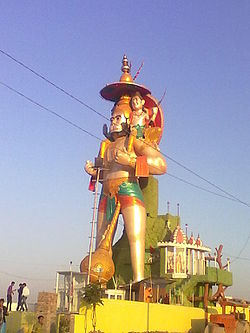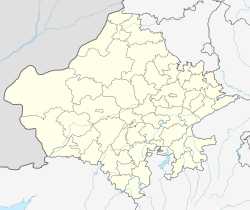Pali, Rajasthan
City in Rajasthan, India From Wikipedia, the free encyclopedia
Pali is a city and capital division in Pali district in Indian state of Rajasthan. It is the administrative headquarters of Pali district. It is on the banks of the river Bandi and is 70 km (43 mi) south east of Jodhpur.
This article has multiple issues. Please help improve it or discuss these issues on the talk page. (Learn how and when to remove these messages)
|
Pali | |
|---|---|
 View of Pali city in Rajasthan. | |
| Coordinates: 25.77°N 73.33°E | |
| Country | India |
| State | Rajasthan |
| District | Pali |
| Government | |
| • Type | Municipal Council |
| • Body | Pali Municipal Council |
| • Chairman | Mrs. Rekha Bhati |
| Area | |
| 77 km2 (30 sq mi) | |
| Population (2011) | |
| 229,956 | |
| • Density | 3,000/km2 (7,700/sq mi) |
| • Metro | 286,214 |
| Languages, | |
| • Official | Hindi, Marwari, Godwari (Rajasthani) |
| Time zone | UTC+5:30 (IST) |
| PIN | 306401 |
| Telephone code rani | 02932 |
| ISO 3166 code | RJ-IN |
| Vehicle registration | RJ-22 |
| Sex ratio | 916 ♂/♀ |
| Website | pali |
History
Summarize
Perspective
Pali (formerly known as Pallika and Palli) was a trade centre. In the 11th century AD, Pali was ruled by the Guhilas of Mewar. In the 12th century it became a part of the Nadol kingdom and was ruled by the Chauhans. In 1153 AD it was ruled by Kumarapala and his feudatory Vahadadeva. Then it came under possession of the Songara Chauhans of Jalore.
The Rathore dynasty chronicles relate that Siyaji or Sheoji, grandson of Chandra, the last Gahadvala Rathore king of Kannauj, came to Marwar on a pilgrimage to Dwarka in Gujarat, and on halting at the town of Pali he and his followers settled there to fight alongside the rajpurohit community from the raids of marauding bands and foreign invaders. Rajputs and Paliwal brahmins fought bravely against Feroz Shah in 13th century but couldn't resist its large army. His devali with the inscription of 1273 AD was discovered 21 km north west of Pali.
Rao Chunda, tenth in succession from Siyaji Rathore, finally wrested control of Marwar from the Pratiharas. His brother's son and successor, Rao Jodha, moved the capital to the city of Jodhpur, which he founded in 1459. Pali remained a part of the Marwar kingdom until 1949, when the last ruling Maharaja acceded to newly independent India. The oldest temple in Pali is the temple of Somanatha. Maharana Pratap was born in Pali. His birthplace is known as Dhanmandi Pali. Maharan Pratap's Statue inaugurated on 4 June 2011 by District Collector Neeraj Kumar Pawan.
Geography
Pali is located at 25.77°N 73.33°E.[1] It has an average elevation of 214 metres (702 feet).
Demographics
As of 2011[update] Indian census,[2] Pali had a population of 229,956. Males constitute 52.2% of the population and females 47.8%. Pali has an average literacy rate of 68.2%, lower than the national average of 74.04%: male literacy is 77.24%, and female literacy is 59%. In Pali, 13% of the population is under 6 years of age.[3]
Industries
Summarize
Perspective
Pali has been famous for its textile industries. Cotton, synthetic clothes, and yarn are exported to other states of India at a very cheap price. Some new industries have also been developed such as those of bangles, marble cutting, marble finishing, etc.
One of the largest composite textile mills in India is the 'Maharaja Shri Umaid Mill' located in Pali. The main products of the mill include cotton and yarn, which are used to prepare different clothes.
There are three industrial areas in Pali, namely the Mandia Road Industrial Area, the Industrial Area phase 1 & 2, and the Punayata Industrial Area. Mandia Road Industrial Area is the largest and the oldest of all.
Besides this, many more industries are situated in different areas of Pali district i.e. leather-based industries, agriculture instruments, chemical industries, cement industries, and mineral-based units. Among these, granite industries have recently flourished due to the easy availability of raw material and favorable geographical location.
However, the problem of pollution is imminent. Common effluent treatment plants have been established in the last few years to treat the discharged water from various industries.
See also
References
External links
Wikiwand - on
Seamless Wikipedia browsing. On steroids.


